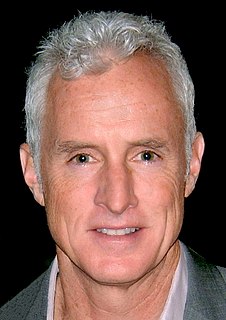A Quote by Soren Kierkegaard
This, then, is the ultimate paradox of thought: to want to discover something that thought itself cannot think.
Related Quotes
The conditions of a true critique and a true creation are the same: the destruction of an image of thought which presupposes itself and the genesis of the act of thinking in thought itself. Something in the world forces us to think. This something is an object not of recognition but of a fundamental encounter
What we take ourselves to be doing when we think about what is the case or how we should act is something that cannot be reconciled with a reductive naturalism, for reasons distinct from those that entail the irreducibility of consciousness. It is not merely the subjectivity of thought but its capacity to transcend subjectivity and to discover what is objectively the case that presents a problem....Thought and reasoning are correct or incorrect in virtue of something independent of the thinker's beliefs, and even independent of the community of thinkers to which he belongs. (p. 71)
I do voiceovers, but being on-camera and selling something? I wasn't really interested. And then I thought, well, wait a minute. Everybody's selling something. When you turn on the tube... And then if you go to Europe or Asia, everyone is selling something. All the guys that don't want to be seen selling something here are selling something there. So I thought what the hell?
If a man considers that he is born, he cannot avoid the fear of death. Let him find out if he has been born or if the Self has any birth. He will discover that the Self always exists, that the body that is born resolves itself into thought and that the emergence of thought is the root of all mischief. Find from where thoughts emerge. Then you will be able to abide in the ever-present inmost Self and be free from the idea of birth or the fear of death.
When I was probably about 10 or 11, and I found it was simply something I could do. When you're at school and you do something and you get praised for it, you think, "Oh, right, well I'll do that." From then on, I always thought I'd be a writer. I thought novels at first, and then I sort of naturally drifted into TV.
I dabbled a little bit in acting in high school, and then I forgot about it completely. And then at about 25 I went to a class. I don't think anybody in my family thought it was an intelligent choice. I don't think anybody thought I'd succeed, which is understandable. I think they were just happy that I was doing something.
Another problem of fragmentation is that thought divides itself from feeling and from the body. Thought is said to be the mind; we have the notion that it is something abstract or spiritual or immaterial. Then there is the body, which is very physical. And we have emotions, which are perhaps somewhere in between. The idea is that they are all different. That is, we think of them as different. And we experience them as different because we think of them as different.
I dabbled a little bit in acting in high school and then I forgot about it completely. And then at about twenty-five I went to a class. I don't think anybody in my family thought it was an intelligent choice. I don't think anybody thought I'd succeed, which is understandable. I think they were just happy that I was doing something.
You cannot “catch” anything unless you think you can, and thinking you can is inviting it to you with your thought. You are also inviting illness if you are listening to people talking about their illness. As you listen, you are giving all your thought and focus to illness, and when you give all of your thought to something, you are asking for it.
...what's always exciting is when you hear something amazing when you least expected it. Every now and then I'll hear something for the first time that forces me to re-examine my frames of reference, and re-consider musical parameters in general, and that's wonderful . And what's even more wonderful in a way, is when you hear something that you know, and already think you have an opinion about, and then suddenly discover that it isn't what you thought it was, but something quite different, which makes it just as surprising as if you'd never heard it before. That's REALLY great!
No ideology can help to create a new world or a new mind or a new human being -- because ideological orientation itself is the root cause of all the conflicts and all the miseries. Thought creates boundaries, thought creates divisions and thought creates prejudices; thought itself cannot bridge them. That's why all ideologies fail. Now man must learn to live without ideologies religious, political or otherwise. When the mind is not tethered to any ideology, it is free to move to new understandings. And in that freedom flowers all that is good and all that is beautiful.
The existence of God is not logically necessary, and yet, on the basis of some profound peculiar empirical order in the universe, it seems that He exists as the ultimate uncreated Being, implying a paradox, as no logically unnecessary entity can be uncreated. This paradox is the ultimate question asked by God, who is nothing but the ultimate questioner.
If you realized how powerful your thoughts are, you would never think a defeatist or negative thought. Since we create through thought, we need to concentrate very strongly on positive thoughts. If you think you can't do something, you can't. But if you think you can, you may be surprised to discover that you can. It is important that our thoughts be constantly for the best that could happen in a situation - for the good things we would like to see happen.








































